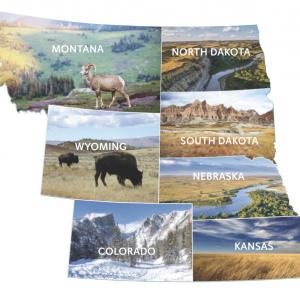New Consortium to Enhance Research Efforts for Adapting to Impacts of Climate Change in North Central Region
Date
In a time when environmental challenges are more pressing than ever, collaboration between research institutions and conservation organizations is paramount. In partnership with the U.S. Geological Survey, a research team at the University of Colorado Boulder via the Cooperative Institute for Research in Environmental Sciences (CIRES) was awarded a 5-year cooperative agreement to continue hosting the North Central Climate Adaptation Science Center (NC CASC). The University of Colorado Boulder will serve as the regional hub for a consortium of partners with the expertise needed to address issues related to wildlife, ecosystems, climate change, and conservation. Over the next five years, this collaboration will enhance research efforts to address the climate adaptation science needs of natural and cultural resource managers from federal, state, Tribal and local governments, and non-profit organizations in the North Central region, which includes Colorado, Wyoming, Montana, North Dakota, South Dakota, Kansas and Nebraska.
One of the NC CASC’s new consortium partners, Colorado State University (CSU), brings in the expertise of two co-principal investigators (co-PIs). Dr. Ana Davidson focuses on wildlife science, with a particular focus on the conservation of North America’s Grasslands and the species that shape and transform these ecosystems. Dr. Courtney Schultz leads the CSU Climate Adaptation Partnership (CAP). Her research focuses on complex governance challenges in land management, particularly in fire-prone forests of the U.S. West. This research is increasingly relevant as wildfires continue to intensify, driven by global climate change. She states that “for the CSU CAP, being part of the CASC is an enormous opportunity to strengthen our research partnerships, increase impact with land managers and communities, and pursue innovative research at the nexus of climate adaptation science and practice.”
Dr. Jeff Martin, a new co-PI from South Dakota State University, brings his expertise in bison health, grassland ecology, and management. Bison, a keystone species in the Great Plains, play a crucial role in maintaining the health of grassland ecosystems. Since bison are categorized as both wildlife and livestock, researchers at his lab explore all aspects of bison management, encompassing private commercial operations, nonprofit non-governmental organizations (NGOs), Tribal herds, and public agency herds—collectively known as the Bison Management System (BMS). This comprehensive approach grants unique opportunities to evaluate diverse management strategies, enhancing the conservation of this iconic species.
At the University of Montana, Dr. Philip Higuera (co-PI) is conducting groundbreaking research on forest fire and vegetation dynamics. His work focuses on understanding how fire regimes shape the structure and composition of forested landscapes. In the context of a changing climate, this research helps predict how ecosystems may respond to future fire activity and informs conservation strategies to protect biodiversity.
The University of Wyoming, a new consortium partner for the NC CASC, is also at the forefront of climate adaptation research. Dr. Corrine Knapp (co-PI) is focused on developing innovative conservation strategies that account for climate change. Her work in climate adaptation and conservation innovation is essential for ensuring that ecosystems and species can continue to thrive as environmental conditions shift. The research also emphasizes collaboration with stakeholders to create adaptive management approaches that are sustainable and forward-thinking. “The University of Wyoming is thrilled to partner with the CASC to create impactful and useful science for Wyoming residents and create new collaborative bridges between our institutions,” she says.
The Nature Conservancy (TNC) is a critical new partner in this research collaboration, working to protect biodiversity and promote sustainable land management practices across the United States. Two key researchers are leading efforts in grassland ecology and conservation: Dr. Terri Schulz (co-PI) is heavily involved in conservation planning, ecology, and land management in Colorado. Her research helps guide conservation efforts in protecting sensitive ecosystems from the threats of habitat loss, development, and climate impacts. Dr. Marissa Ahlering (co-PI) focuses on grassland ecology and climate change solutions, particularly in the Northern and Southern Plains of the Dakotas. Her work is important for understanding how grasslands are being affected by climate change and developing strategies to mitigate these effects. As she states, “climate adaptation is no longer optional. We have to think about how climate adaptation is in all aspects of our work and that is a very big task. We are excited to join a community of folks who are also wrestling with these issues on a daily basis so that we can do problem solving together.”
Indigenous perspectives and knowledge are increasingly being recognized as integral to effective environmental stewardship. The NC CASC’s continuing partnership with the Great Plains Tribal Water Alliance (GPTWA), with Reinique Beck (co-PI), focuses on Tribal water quality and management. Beck’s work ensures that water resources are managed sustainably and equitably for the benefit of Tribal communities. She believes that “the GPTWA partnership with NC CASC gives our Tribal environmental managers access to climate science experts who help develop adaptation and mitigation strategies, enhancing our Tribal nations' resilience to climate change in managing natural resources.”
Each of these co-PIs bring unique expertise and perspectives, contributing to a broader understanding of how ecosystems function and how we can better protect them. The research being conducted will not only contribute to scientific knowledge but also policy and conservation practices. As environmental threats become more pronounced, collaborative efforts like these at the NC CASC will be critical to safeguarding the health of our region’s ecosystems for future generations.


